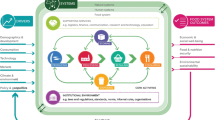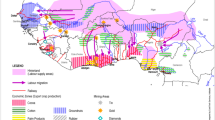Abstract
Famines were apparently eradicated from Asia and Europe during the twentieth century, but not from Africa, where three countries—Ethiopia, Malawi and Niger—have suffered mass mortality food crises since 2000. This paper locates the persistence of famine in Africa in simultaneous or sequential failures of food supply, demand for food, and humanitarian responses. Each of the three recent crises was triggered by a moderate decline in crop and/or livestock production, exacerbated by ‘exchange entitlement failures’—food price spikes and asset price collapses. The critical analytical question, however, is not why these famines happened, but why they were not prevented. Information failure is rejected as an explanatory factor in favour of ineffective and inappropriate interventions, adverse relations between governments and donor agencies at critical moments, and unaccountability for famine prevention in low-income countries with weak democracies and interventionist development partners.
Similar content being viewed by others
References
Africa Watch (1991) Evil days: 30 years of war and famine in Ethiopia. Human Rights Watch, Washington DC
Alderman H, Haque T (2007) Insurance against covariate shocks: The role of index-based insurance in low-income countries of Africa, Africa human development series, Working Paper, 95. World Bank, Washington DC
Banik D (2007) Starvation and India’s democracy. Routledge, London
Bradbury M (1998) Normalising the crisis in Africa. Disasters 22(4):328–338
Buchanan-Smith M, Davies S (1995) Famine early warning and response: The missing link. Intermediate Technology Publications, London
Carr S (1998) Root crop production in Malawi: some anomalies in the data, Mimeo, Zomba, Malawi
Carr S (2003) Food shortages in Malawi 2001–2003, Mimeo, Zomba, Malawi
Clay D, Molla D, Habtewold D (1999) Food aid targeting in Ethiopia: a study of who needs it and who gets it. Food Policy 24(4):391–409
Darcy J, Hofmann C (2003) According to Need? Needs assessment and decision-making in the humanitarian sector, HPG Report, 15. Overseas Development Institute, London
Davis M (2001) Late Victorian Holocausts: El Nino famines and the making of the Third World. Verso, London
de Waal A (1997) Famine crimes: Politics and the disaster relief industry in Africa. James Currey, Oxford
de Waal A (2000) Democratic political process and the fight against famine, IDS Working Paper, 107. Institute of Development Studies, Brighton
Devereux S (2000) Famine in the twentieth century, IDS working paper, 105. Institute of Development Studies, Brighton
Devereux S (2005) Old failures feed new famines: Starvation strikes emerging democracies, New Internationalist, 383: 2–3 [http://www.newint.org/issue383/currents.htm, accessed 24/03/2006]
Devereux S (2006) Vulnerable livelihoods in Somali Region, Ethiopia, IDS Research Report, 57. Institute of Development Studies, Brighton
Devereux S (2007) Introduction: From “old famines” to “new famines”, Chapter 1 in Devereux S (ed) The new famines. Routledge, London
Devereux S (2008) Innovations in the design and delivery of social transfers: Lessons learned from Malawi, Concern worldwide policy paper. Concern Worldwide, London
Devereux S, Tiba Z (2007) Malawi’s first famine, 2001–2002, Chapter 7. In: Devereux S (ed) The new famines. Routledge, London
Dorward A, Kydd J (2004) The Malawi 2002 food crisis: the rural development challenge. J Mod Afr Stud 42(3):343–361
Drouhin E, Defourny I (2006) Niger: taking political responsibility for malnutrition. Humanitarian Exchange 33:20–22 March
Edkins J (2007) The Criminalisation of mass starvations: From natural disaster to crime against humanity, Chapter 3. In: Devereux S (ed) The new famines. Routledge, London
FAO (2004) Intergovernmental working group for the elaboration of a set of voluntary guidelines to support the progressive realization of the right to adequate food in the context of national food security, final report of the chair. FAO, Rome
FEWS NET (2001) Malawi monthly food security report: mid-May–mid-June 2001. FEWS NET, Lilongwe June
FEWS NET (2002) Malawi monthly food security report: mid-March–mid-April 2002. FEWS NET, Lilongwe March
FEWS NET (August 2005) Rapport Mensuel sur la Sécurité Alimentaire au Sahel et en Afrique de l’Ouest, FEWS NET
Haggard S, Noland M (2007) Famine in North Korea: Markets, aid, and reform. Columbia University Press, New York
Howe P (2007) Priority regimes and famine, chapter 15. In: Devereux S (ed) The new famines. Routledge, London
Howe P, Devereux S (2004) Famine intensity and magnitude scales: a proposal for an instrumental definition of famine. Disasters 28(4):353–372
International Development Committee (2003) The humanitarian crisis in Southern Africa, Third Report of Session 2002–2003. House of Commons, London
Khalif M, Doornbos M (2002) The Somali Region in Ethiopia: a neglected human rights tragedy. Rev Afr Polit Econ 91:73–94
Lautze S, Maxwell D (2007) Why do famines persist in the Horn of Africa? Ethiopia, 1999–2003, Chapter 10. In: Devereux S (ed) The new famines. Routledge, London
Lautze S, Raven-Roberts A, Teshome Erkineh (forthcoming) ‘Humanitarian Governance in the New Millennium—an Ethiopian case study, ODI Working Paper, London: Overseas Development Institute
Maxwell D (2002) Why do famines persist? a brief review of Ethiopia 1999–2000. IDS Bull 33(4):48–54
Mousseau F, Mittal A (2006) Sahel: A prisoner of starvation? A case study of the 2005 food crisis in Niger. The Oakland Institute, Oakland
Olsen G, Carstensen N, Hoyen K (2003) Humanitarian crises: what determines the level of emergency assistance? Media coverage, donor interests and the aid business. Disasters 27(2):109–126
Overseas Development Institute (ODI) (2005) Humanitarian issues in Niger’, HPG Briefing Note. London, ODI
Rubin O (2009) The Niger famine: a collapse of entitlements and democratic responsiveness, Journal of Asian and African Studies, 44(3) (forthcoming)
Salama P, Assefa F, Talley L, Spiegel P, van der Veen A, Gotway C (2001) Malnutrition, measles, mortality, and the humanitarian response during a famine in Ethiopia. JAMA 286(5):563–571
Sandford S, Habtu Y (2000) Emergency response interventions in pastoral areas of Ethiopia, Addis Ababa: Department for International Development (DFID)
Sen A (1981) Poverty and Famines: An essay on entitlement and deprivation. Clarendon, Oxford
Sen A (1999) Democracy as Freedom. Oxford University Press, Oxford
Watson F (2007) Why are there no longer ‘war famines’ in contemporary Europe? Bosnia besieged, 1992–1995, Chapter 12. In: Devereux S (ed) The new famines. Routledge, London
World Food Programme (2000) Findings and recommendations of the mission to Kenya and Ethiopia between 17–23 September 2000. World Food Programme, Rome
Author information
Authors and Affiliations
Corresponding author
Rights and permissions
About this article
Cite this article
Devereux, S. Why does famine persist in Africa?. Food Sec. 1, 25–35 (2009). https://doi.org/10.1007/s12571-008-0005-8
Received:
Accepted:
Published:
Issue Date:
DOI: https://doi.org/10.1007/s12571-008-0005-8




